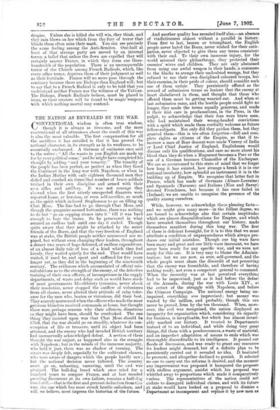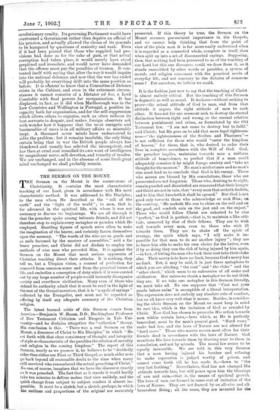THE NATION AS REVEALED BY THE WAR.
CONVENTIONAL wisdom is often true wisdom, though it is always so tiresome, and the most conventional of all utterances about the result of this war is also the most valuable. The first compensation for all the sacrifices it has entailed is that it has proved the national character, in its strength as in its weakness, to be essentially unchanged. A German of eminence once said to the writer : " All the wants in you English are made up for by your political sense," and he might have completed his thought by adding " and your tenacity." The tenacity of the people has been perfect, as perfect as when they faced the Continent in the long war with Napoleon, or when in the Indian Mutiny with only eighteen thousand men they defied and crushed six times that number of brave soldiers trained in their own discipline and armed with their own rifles and artillery. It was not courage they showed when the first utterly unexpected disasters were reported home, or heroism, or even self-sacrifice, so much as the spirit which induced Stephenson to go on filling up Chat Moss. The line had to go through Chat Moss, and though the quagmire seemed bottomless, there was nothing to do but " go on copping stones into it " till it was hard enough to bear the trains. So he persevered in what seemed an endless task until one day it ended. Though quite aware that they might be attacked by the secret friends of the Boers, and that the very freedom of England was at stake, the British people neither murmured nor re- pined, but without even changing their leaders, throughout a dreary two years of hope deferred, of endless expenditure, of an almost daily tale of loss of a kind which they feel keenly, they waited quietly for the end. They would have waited, if need be, and spent and suffered for five years longer yet, as they did. in the beginning of the nineteenth century. The evidences which accumulated of official mis- calculations as to the strength of the enemy, of the defective training of their own officers, of incompetence in the supply departments, of waste and delay such as would have made of most governments bloodthirsty tyrannies, never shook their resolution, never stopped the outflow of volunteers from all classes, never altered their attitude of calm toler- ance for the men who, beaten or victorious, (lid their best. They scarcely murmured when the officers who made the most grievous blunders received commands at home, but thought there were perhaps reasons why their offences, disastrous as they might have been, should be overlooked. The one thing they insisted upon was that Chat Moss should be tilled, that the war should go on steadily, whatever its con- sumption of life or treasure, until its object had been attained, and the enemy who had invaded British territory had unreservedly acknowledged defeat. A section of them thought the war unjust, as happened also in the struggle with Napoleon ; but in the minds of the immense majority, who held it just, there was no shadow of turning. The strain was deeply felt, especially by the cultivated classes, who were aware of dangers which the people hardly saw ; but the national decision never faltered. The country must go on, unhasting, tmresting, until the end was attained. The bull-dog breed which once tried for a hundred years to conquer France, and at last receded growling discontent at its own failure, remains a bull-dog breed still,—that is the first and greatest deduction from this war, the one which has most struck hostile onlookers, and will, we believe, most impress the historian of the future. And another quality has revealed itself also,—an absence of vindictiveness almost without a parallel in history. From first to last, beaten or • triumphant, the English people never hated the Boers, never wished for their extir- pation, never objected to give them any terms consistent with their end. To their own immense injury, for the world misread their philanthropy, they protected their enemies' wives and children. They not only abstained from using one awful weapon in their hands, a summons to the blacks to avenge their undoubted wrongs, but they refused to use their own disciplined coloured troops, lest their enemies, in their pride of colour, should consider such use of them unfair. They persistently offered as the reward of submission terms so lenient that the enemy at heart disbelieved in them, and thought that those who offered them must be getting wearied out. And when at last submission came, and the hostile people could fight no longer, they made the terms equally generous, and made it their first care in proclamations, in the Press, in the pulpit, to acknowledge that their foes were brave men, who had maintained their wrong-headed convictions with a spirit which made them cordially welcome as future fellow-subjects. Not only did they pardon them, but they granted them—this is too often forgotten—full and com- plete rights as citizens of the Empire, so that if to- morrow a man of Boer descent were made Viceroy of India or Lord Chief Justice of England, Englishmen would discuss only his qualifications, and care no more about his blood than they do when a Huguenot becomes a Peer or the son of a German becomes Chancellor of the Exchequer. We are so accustomed to this state of mind that we forget how long it has existed, how strange a break it is in our national insularity, how splendid an instrument it is in the building up of Empire. We recognise that latter fact in France, which has made of Germans (Alsace-Lorraine) and Spaniards (Navarre) and Italians (Nice and Savoy) devoted Frenchmen, but because it has once failed us (Ireland) we are unable to recognise the presence of the quality among ourselves.
While, however, we acknowledge these pleasing facts— and we might give many more—in the fullest degree, we are bound to acknowledge also that certain ineptitudes which are almost disqualifications for Empire, and which have revealed themselves throughout our history, made themselves manifest during this long war. The first of these is deficient foresight, for it is to this that we must attribute a condition of unpreparedness which always pro- duces our initial mistakes. Though our big wars have been many and great and our little wars incessant, we have never been ready for any specific war, and we were not ready for this one. It is very easy to blame the Adminis- tration ; but we are now, as ever, self-governed, and the whole people must share the discredit of not perceiving that the enemy was formidable, and therefore of having nothing ready, not even a competent general to command. When the necessity was at last perceived everything had to be improvised, just as it had before the defeat of the Armada, during the war with Louis XIV., at the outset of the struggle with Napoleon, and before the Crimean Campaign. The national energy being un- impaired, everything was improvised ; but money was wasted by the million, and probably, though this can never be proved, lives by the ten thousand. When, more- over, the evil was recognised, the nation displayed an incapacity for organisation which, considering its capacity for business, is inexplicable, but which has almost invari- ably marked our history. It trusted to Departments instead of to an individual, and while doing very great things, did them with a ponderousness, a waste of material, and an imperfect adaptation of means to ends which was thoroughly discreditable to its intelligence. It poured out floods of discussion, and was ready to grant any resources its leaders might demand, but of a definite plan to be persistently carried out it revealed no idea. It hesitated to promote, and altogether declined to punish. It selected no one to carry out the reforms it desired, and the moment any improvement was proposed it hampered the proposer with endless argument, amidst which his proposal was whittled away to proportions which made it comparatively rseless. The representatives of the nation could not endure to disregard individual claims, and with its future at stake would have looked on a proposal to dismiss a Department'as incompetent and replace it by new men as revolutionary cruelty. Its governing Parliament would have overturned a Government rather than deprive an official of his pension, and actually allowed the choice of its generals to be hampered by questions of seniority and rank. Even if it had been proved that those who supplied bad pro- visions had done so for the sake of gain, or that actual corruption had taken place, it would merely have stood perplexed and irresolute, and would never have demanded that the offence must pay the penalties of treason. It con- tented itself with saying that after the war it would inquire into the national defences, and now that the war has ended will probably let everything drift into the same position as before. It is content to know that a Committee of Defence exists in the Cabinet, and even in the extremest circum- stances it cannot conceive of a Dictator ad hoc, a Lord Constable with final powers for reorganisation. It has displayed, in fact, as it did when Marlborough was in the Low Countries and Wellington in Portugal, a positive in- capacity both for organisation, and for the self-suppression which allows others to organise, such as often reduces its bast servants to despair, and makes foreign observers ask with wonder how it happens that the most energetic and businesslike of races is in all military affairs so miserably inept. A thousand acute minds have endeavoured to solve the problem ; but it remains insoluble, the only thing certain being that in war the British people always has blundered and usually has selected the incompetent, and has then at cruel cost remedied its own want of intelligence by magnificent nerve, self-devotion, and tenacity of resolve. We are unchanged, and in the absence of some fresh great mind unchanged we shall probably remain.







































 Previous page
Previous page